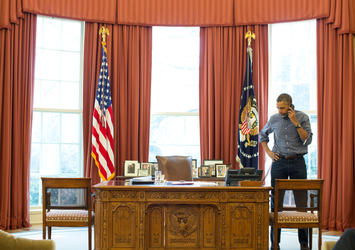Obama, Putin talk Ukraine crisis over the phone
The White House


A free daily email with the biggest news stories of the day – and the best features from TheWeek.com
You are now subscribed
Your newsletter sign-up was successful
Just like the classic game of Telephone, President Barack Obama and Russian President Vladimir Putin have two very different takeaways from a Monday phone call.
According to TIME, the White House said that Obama expressed "grave concern" over Russia's presence in Ukraine, and "emphasized that all irregular forces in the country need to lay down their arms." He also urged Putin to use his influence with armed pro-Russian groups to request that they leave buildings they have captured.
Meanwhile, a press release from the Kremlin stated that reports of Russia interfering in southern Ukraine are "based on inaccurate information," and that ongoing protests in the eastern provinces are the result of "the Kiev authorities' unwillingness to take into account the interests of the Russian and Russian-speaking population."
The Week
Escape your echo chamber. Get the facts behind the news, plus analysis from multiple perspectives.

Sign up for The Week's Free Newsletters
From our morning news briefing to a weekly Good News Newsletter, get the best of The Week delivered directly to your inbox.
From our morning news briefing to a weekly Good News Newsletter, get the best of The Week delivered directly to your inbox.
Earlier Monday, leaders from Kiev asked that the United Nations send peacekeepers after pro-Russian protesters seized more government buildings. During Monday's phone call — the second between the U.S. and Russian presidents during the past few weeks — Obama reportedly commended the Ukrainian government for its management of the crisis and for holding an election scheduled for May 25.
A free daily email with the biggest news stories of the day – and the best features from TheWeek.com
Catherine Garcia has worked as a senior writer at The Week since 2014. Her writing and reporting have appeared in Entertainment Weekly, The New York Times, Wirecutter, NBC News and "The Book of Jezebel," among others. She's a graduate of the University of Redlands and the Columbia University Graduate School of Journalism.
-
 The Olympic timekeepers keeping the Games on track
The Olympic timekeepers keeping the Games on trackUnder the Radar Swiss watchmaking giant Omega has been at the finish line of every Olympic Games for nearly 100 years
-
 Will increasing tensions with Iran boil over into war?
Will increasing tensions with Iran boil over into war?Today’s Big Question President Donald Trump has recently been threatening the country
-
 Corruption: The spy sheikh and the president
Corruption: The spy sheikh and the presidentFeature Trump is at the center of another scandal
-
 British warship repels 'largest Houthi attack to date' in the Red Sea
British warship repels 'largest Houthi attack to date' in the Red SeaSpeed read Western allies warn of military response to Iranian-backed Yemeni rebels if attacks on ships continue
-
 Houthi rebels claim Red Sea ship attacks
Houthi rebels claim Red Sea ship attacksspeed read Iran-backed Yemeni group vows to escalate aggression towards Israel-linked vessels in revenge for Gaza war
-
 Israel plans next phase of Gaza war as first hostages released
Israel plans next phase of Gaza war as first hostages releasedSpeed read After four-day ceasefire 'we will not stop' until destruction of Hamas, says Israel
-
 Mob storms Russian airport 'looking for Jews'
Mob storms Russian airport 'looking for Jews'Speed Read Plane from Israel surrounded by rioters chanting antisemitic slogans after landing in Russia's Dagestan region
-
 Tuberville's military promotions block is upending lives, combat readiness, 3 military branch chiefs say
Tuberville's military promotions block is upending lives, combat readiness, 3 military branch chiefs saySpeed Read
-
 Ukraine's counteroffensive is making incremental gains. Does it matter in the broader war?
Ukraine's counteroffensive is making incremental gains. Does it matter in the broader war?Speed Read
-
 US commissions first-ever Navy ship in a foreign port
US commissions first-ever Navy ship in a foreign portSpeed Read
-
 British spy chief, Wagner video suggest Prigozhin is alive and freely 'floating around'
British spy chief, Wagner video suggest Prigozhin is alive and freely 'floating around'Speed Read
